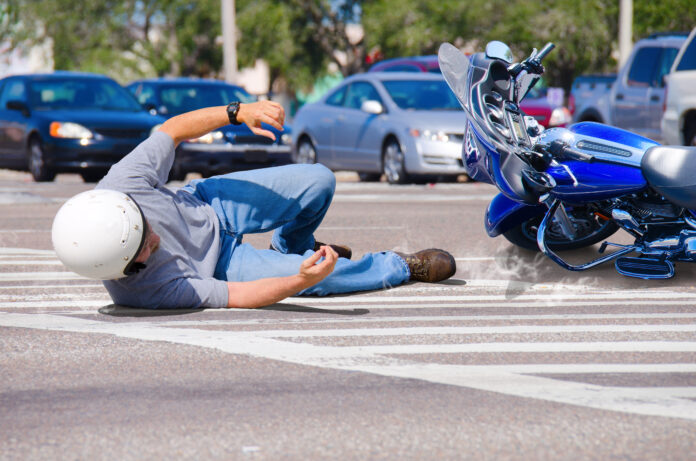If you have a motorcycle, then you might enjoy riding it often. You might take it to work daily. You may also ride it on the weekends or whenever you want some downtime and an activity that takes your mind off your troubles.
You should know that motorcycles do have some inherent risks that go with them, though. When you ride one, you don’t have the protective metal frame around you that you get with a car.
If a vehicle hits you while you’re riding your motorcycle, you must go through several steps. We’ll talk about those right now.
You Must Seek Medical Attention
Getting justice after a motorcycle accident probably appeals, but you must follow protocol before you can do that. First, you must seek medical attention if you need it.
If you can, call 911. You might have a smartphone on you. You should carry one. You can use it if anything bad ever happens when you are out riding your motorcycle.
If you don’t have a smartphone or are badly hurt and can’t contact an ambulance, someone else must do it for you. Hopefully, the vehicle that hit you stuck around, and the driver or a passenger can call 911.
The operator can send an ambulance and the police as well. The cops must document the crash site and take statements.
Talk to the Police
Once you are at the hospital and get medical attention, you can tell the police what happened. Don’t omit any details, and don’t embellish.
You should tell the truth since dash camera footage or traffic camera footage might exist. If you say something happened that didn’t, the police will likely find that out.
If you didn’t need medical attention, you could give the police your statement at the crash site.
Make sure you get yourself and your motorcycle off the road if you can. That way, you can make sure that passing traffic won’t hit you or your motorcycle again.
Get Your Motorcycle into the Shop
Next, you can get your motorcycle into a garage where a mechanic can look it over. Maybe it sustained some serious damage, or perhaps the crash did not impact it very much.
Either way, you will certainly want to get it up and operating again as fast as you can.
Your insurance might cover the damages, or the other person’s insurance policy might as well. You can look into that next.
Contact Your Insurance Company
Once you’re home and medical professionals have treated any wounds you have, you can contact your insurance company next. Presumably, you have insurance.
If you have no policy, you shouldn’t ever drive a motorcycle or any other vehicle.
You can tell your insurance company what happened. Like the accident description that you give the police, you should not omit details.
You can use short, declarative sentences when talking about the accident.
You shouldn’t speculate about who caused the accident. That’s not necessary. The facts should reveal that information without you saying you think you or the other driver caused the wreck.
Contact the Other Driver’s Insurance Company
You must also contact the other driver’s insurance company. They should give you the company’s information at the crash site. If the other driver didn’t give you a phone number, you should easily find one online.
You can contact the company and tell them what happened. Again, don’t speculate about who caused the wreck.
If they press you about that, do not answer. They might hope you’ll say you caused the accident. Don’t do that. You should feel sure that they’re recording the call, and they can use an admission of guilt against you later.
Contact Your Employer
You might contact your employer next. If the crash injured you, you should tell them that. Maybe you must miss some work. You can tell your boss that as quickly as you possible.
If they require some documentation indicating a doctor says you must miss work, you might get that for them. Ideally, though, your boss will believe you when you say that you’re temporarily incapacitated.
Contact a Lawyer
At this point, you might also contact a lawyer. Nothing says you must hire one, but maybe you’re in a situation where the driver who hit you feels you caused the wreck. Their insurance company might also believe that.
If you feel differently, you need a lawyer to represent you as you get through the next few days. You might meet with an attorney, preferably one who has previously handled these motorcycle accident lawsuits.
They can tell you whether they think you have a lawsuit based on what you say happened. If they say they’ll take your case, you can work out a payment method at that time.
You will probably want a lawyer who will take your case that you can pay using a contingency payment option.
That means they collect no money unless they get a settlement or a jury’s judgment in your favor. If they lose the case, you will pay them no cash whatsoever.
They will start the investigation immediately. They should have some investigators on their payroll who can check out the crash site.
They can find out whether anyone saw the wreck. Those eyewitnesses should help you win your case if the driver who hit you or their insurance company didn’t settle.
The investigator might find any crash footage that exists. They might look at dash camera footage, store camera footage, or traffic camera footage.
Maybe someone walking by got a video of the crash by accident. That happens fairly often these days with so many smartphones with cameras out there.
Your attorney can fight for you in court. Eventually, they can get you a settlement offer if it becomes clear that the other driver caused the wreck. If you must go through the trial and get a jury’s verdict, you might collect even more money.
Key Takeaways
- Motorcycles have inherent risks associated with riding them.
- Seek medical attention if you are injured in a motorcycle accident.
- Call 911 if you can, or ask someone else to do it.
- Talk to the police and provide a truthful statement.
- Get your motorcycle to a garage and have it checked by a mechanic.
- Contact your insurance company and give them a detailed account of what happened.
- Contact the other driver’s insurance company and tell them what happened.
- Inform your employer if the accident caused you to miss work.
- Consider hiring a lawyer if the other driver’s insurance company denies your claim or if there is a dispute over who caused the accident.
- Look for a lawyer to take your case with a contingency payment option.
- Your lawyer will investigate the crash site and look for any eyewitnesses or footage of the accident.
- If necessary, your lawyer can represent you in court and help you get a settlement offer or a jury’s verdict.
ALSO READ:




